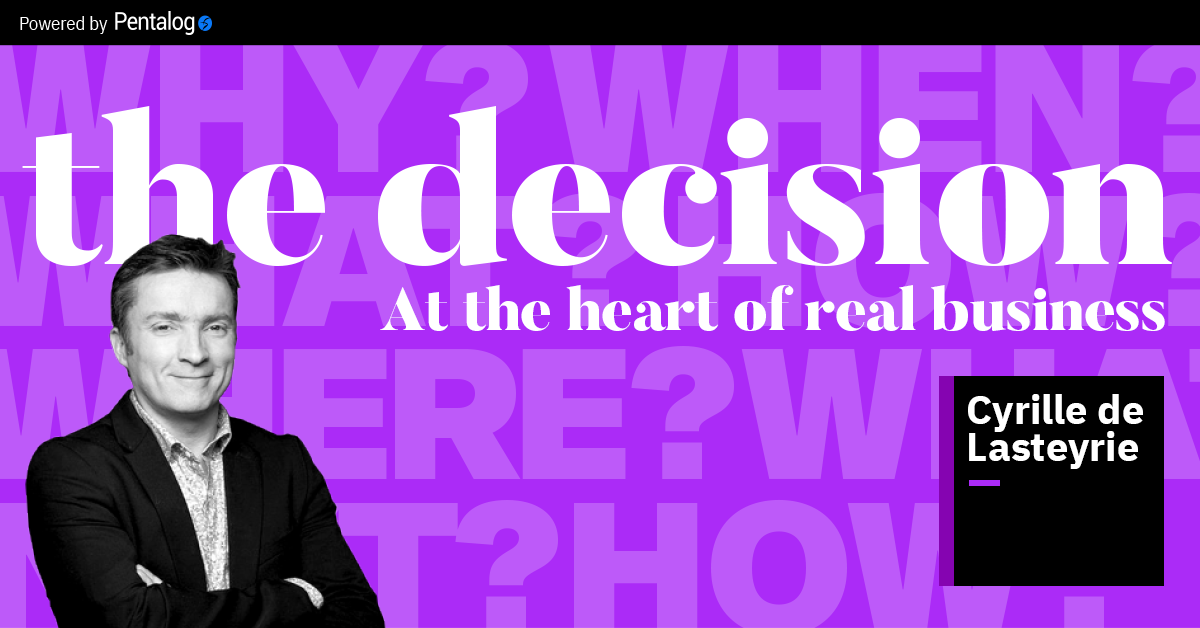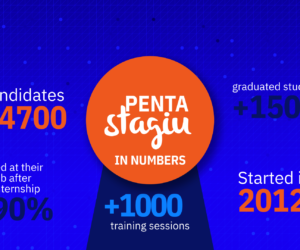What is fascinating in this first episode of The Decision with Bruno Larvol, CEO and founder of Larvol (based in California), is that it gave us a chance to discover how, in taking the decision to change the corporate tagline, the solid leader of a very serious company of 150 people practically checked every last one of the “what not to do” boxes.
A decision born from personal desire (but was this change really necessary?), a single suggested possibility (“Crazi for health” – and nothing to compare it to), an accident of spelling (crazi, not crazy), an appeal to social networks (where ‘the crowd’ was not briefed, does not know the issues, and is not particularly involved), the call to a friend (and the dangers of caring but subjective advice), and finally, a last-minute switch to a completely different idea. A manifestly top-down process that blends intuition, impertinence, chance and will-power.
Well – I agree with this process, 100%.

Not only do I subscribe to this approach, but I think that this episode should be shown in every school on the planet where they teach business / design / communication / management. Why? So that future consultants and creative types of all sorts can prepare for the real world. In the vast majority of cases, this is how decisions get made. We’re a long way from the Hollywood image of methodical pro-and-con discussions, PowerPoint presentations, thick market studies bound in multiple copies, cardboard models presented by creative people as stressed as guinea pigs on acid.
No, this is the real world, and in the real world, the boss takes the risks, so it’s his – or her – call. More, as the founder of the company, Bruno Larvol naturally has all the authority of a father-figure for everyone in the company – he is the Jedi Master. And between the Father-Jedi and his market, there is an invisible and intangible link that does not fit into any SWOT analysis (Strengths – Weaknesses – Opportunities – Threats). This link, like the link between a craftsperson and their material, must be constantly maintained, by carefully maneuvering all the levers: product, price, technology, teams, reputation, image – and tagline … If even one of these settings goes wrong, and that link tightens or loosens, it isn’t any good for anyone. The entrepreneur-founder feels and sometimes even suffers for every one of these levers – in a very personal way.
And that’s not all. There is that small portion of the ego – human, all too human. Listening between the lines, we can detect the subtle pleasures of asserting a form of leadership. But this pleasure is not tainted – in fact, for a business, it’s gold. Whether at the end we get the tag “Semper Tigris” or the tag “My knees on the ping pong table,” I would almost say that we don’t care. I say “almost”, because it’s important not to get carried away. Because the impetus that Bruno Larvol is giving to the company at this time is palpable. That push is in tune with the company’s market, it conveys a perceptible will, it defends the strong arguments that support it, and it imposes a state of mind.
In this case, Bruno Larvol has full powers, but that’s actually not unusual. Thousands of companies operate on this model and encounter similar challenges. Obviously, the more a company grows, the more power is diluted. The more power is diluted, the more the decision-making process becomes long and consensual and requires analyses and studies, with stressed consultants, committees and opposing opinions. In the end, we may even lose the desire to know why we are meeting in the first place, just so long as everyone is kept reassured.
Bruno Larvol does not intend to reassure; he wants to interest, surprise, arouse, compel. I think he succeeds.
To find out more about Bruno Larvol’s decision, watch the first episode of “The Decision“:
We were discussing this initial episode with Frédéric Lasnier, the boss of Pentalog, who knows Bruno well. He said that this was also his daily life. Being able to make a decision on Monday (“Crazi for health”) that you know is not great – then on Wednesday, knowing how to listen to counter-arguments – finally, on Friday, reaching a brilliant decision (“Semper tigris”). This cycle works with every subject, every day – and that is what makes decisions so exciting. Frédéric and I are both betting that this tagline will still be around in 5 years – and we’ve already penciled in our appointment with Bruno Larvol.
Another appointment, closer in time, comes up next Friday with the second episode of The Decision. We’ll be looking at another important decision: how the CEO-buyer of CONFORMit, a Canadian company, decided to reorganize the entire company to agile mode, to the point where “holacracy” becomes a philosophy not only of work, but of life. It was, it seems, not an easy decision, and I can’t wait to hear about it.
To make sure you don’t miss out on this new opus, don’t forget to register here. This helps us get to know you – who are watching us – a little better, and it helps make sure that you won’t miss the next episode. Win-win!











